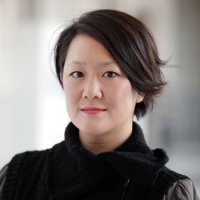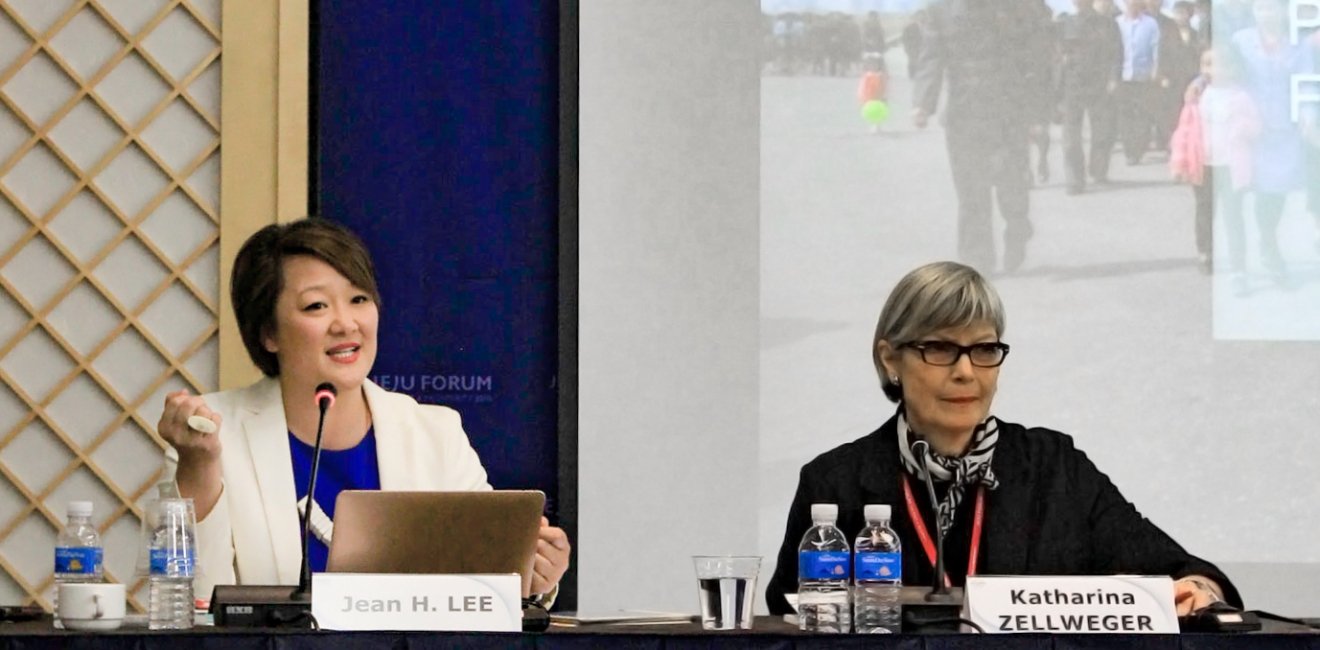
A blog of the Indo-Pacific Program
Featured Speaker: Katharina Zellweger of KorAid
Over the past two years, much of the foreign media attention on North Korea has focused on security and diplomacy, with the spotlight fixed squarely on leader Kim Jong Un as he embarks on an unprecedented diplomatic campaign. Often missing from the picture: the daily lives of the ordinary people of North Korea, from farmers to factory workers, coping with tough international sanctions and an uncertain future at a time of stalled nuclear negotiations with the United States.
“Say the words ‘North Korea,’ and most everybody thinks of the country’s nuclear weapons program, the Singapore and Hanoi Summits between U.S. President Trump and North Korean Leader Kim Jong Un, and starving children,” says Katharina Zellweger, director of the NGO KorAid and a visiting scholar at Stanford University. “Forgotten are the 25 million ordinary individuals who just happen to have been born there, and who are struggling day by day just to get by.”
In late May, we invited Kathi Zellweger to join us at the Jeju Forum for Peace and Prosperity in Jeju, South Korea, to help fill in the picture of life inside North Korea over the past 24 years.
Also joining us on the Perspectives from Pyongyang panel: the economist and former Wilson Center fellow Byung-yeon Kim of Seoul National University, author of the 2017 book “Unveiling the North Korean Economy,” who worked around the lack of data from the North Koreans by surveying defectors for his detailed study of the country’s little-understood economy. The AFP photojournalist Ed Jones and AFP bureau chief Sebastien Berger – today among the only Western journalists able to report regularly from Pyongyang – shared a selection of Jones’ insightful images, along with the backstory into the making of their photo essays. Along with Katie Stallard-Blanchette, who traveled to North Korea and reported on the country as head of Sky News’ Asia bureau before joining us at the Wilson Center as a fellow last year, we discussed the challenges and merits of covering North Korea, given the restricted access and tightened international sanctions.
Few foreigners know North Korea as well as Kathi Zellweger, who made her first visit with the charity Caritas in the spring of 1995 when the country was in the throes of a famine and just beginning to allow in foreign aid. When I knew her during my time reporting from Pyongyang for the AP news agency, she was living in the capital as head of the North Korea office of the Swiss Agency for Development and Cooperation. Back then, we shared many humble meals and a fascination for North Korea’s propaganda art. Her most recent visit was last week with KorAid, which focuses on helping disabled North Koreans.
The picture that emerged from her presentation was one of a country divided between the haves and have-nots...
Kathi has seen the country evolve, in large and small ways, through two major transitions of leadership. And she observes the changes with a clear-eyed sense of compassion for the people, a forthrightness that has earned her immense respect from the North Koreans. The picture that emerged from her presentation was one of a country divided between the haves and have-nots, a nation seeking to modernize but still mired in crushing poverty and chronic food insecurity.
Have things changed since 1995? “Yes and no,” she said, noting the visible changes in the economy, which she calls the M’s: markets and money, mobile phones, motorcars, and an emerging middle class in Pyongyang.
But outside the capital, millions still struggle to put food on the table, she noted, citing a World Food Program assessment released earlier in the month. Even today, in 2019, farmers rely on oxen to plow the fields; tractors and fuel are few and far between, she noted.
Her concern: chronic malnutrition, particularly among children, who are not growing up with the diversity of diet needed to develop properly mentally and physically. She noted the continued lack of clean drinking water and basic sanitation for half the nation’s population, and hospitals operating with outdated equipment and sporadic electricity. North Korea now has the fifth-highest rate of tuberculosis in the world, with a looming crisis over untreated multi-drug resistant TB.
Already short on food, North Korea faces the prospect of poor harvests this year. Lack of fertilizer, low snowfall and a dearth of spring rain are expected to affect their staple crops of rice, maize, potatoes and soy, she noted.
Market activity is up, showing the people’s capacity to adapt to tough conditions and continued sanctions.
To cope, North Koreans are growing their own food in greenhouses and state-run factories are producing more locally processed food. Market activity is up, showing the people’s capacity to adapt to tough conditions and continued sanctions.
Her NGO, KorAid, aims to help North Korea treat its neediest, including children, the ill and the elderly. Among its projects:
- Supporting 9,000 cataract operations annually by importing lenses, special eye drops and essential equipment
- Providing material for the production of 1,000 orthopedic devices yearly at a rehabilitation center in the northern city of Hamhung
- Training programs for staff at institutions as well as caregivers working with special needs children, such as workshops on autism
- Building and renovating greenhouses at children’s homes to help improve their access to nutritious foods, a project currently on hold due to sanctions.
Overall, the improvement in conditions in North Korea since 1995 is “modest,” Kathi says. But she sees some signs of promise in the resilience and resourcefulness of North Koreans today.
“Ordinary citizens nowadays have better coping strategies than they did during the famine years,” she said. “Markets are accepted by the government, and with that, also making money. The uniformity is gone.”
"We now have many realities in North Korea."
“There is a certain amount of decentralization, and today, the situation differs from place to place. We now have many realities in North Korea. The country’s economy has changed from ration-based to a de facto market economy, but the state’s control over the people is still quite strong.”
Amid the daily difficulties and hardship Kathi witnesses, she says there is a ray of light.
“Today, another ‘M’ can be added. This ‘M’ is for mindsets,” she said. “Citizens’ mindsets are changing, too, particularly among the younger generation in Pyongyang, but also in other locations. These are young adults who grew up in a time when the regime stopped providing everything, including food, clothing, many daily necessities, education and health care services. They are not used to receiving government handouts.”
“They are finding their own ways to make ends meet,” she says. “They have, therefore, developed a certain entrepreneurial spirit.”
___
Thanks to the Jeju Peace Institute for co-hosting the Perspectives from Pyongyang panel discussion at Jeju Forum, and to Darcie Draudt (@DarcieDraudt) for serving as rapporteur.
Jean H. Lee (@newjean), is director of the Hyundai Motor-Korea Foundation Center for Korean History and Public Policy (@Korea_Center) at the Wilson Center. As a journalist, she opened the AP news agency’s Pyongyang bureau in 2012.
The views expressed are the author's alone, and do not represent the views of the U.S. Government or the Wilson Center. Copyright 2019, Asia Program. All rights reserved.
Author

Journalist and former Pyongyang Bureau Chief, Associated Press

Indo-Pacific Program
The Indo-Pacific Program promotes policy debate and intellectual discussions on US interests in the Asia-Pacific as well as political, economic, security, and social issues relating to the world’s most populous and economically dynamic region. Read more


Hyundai Motor-Korea Foundation Center for Korean History and Public Policy
The Center for Korean History and Public Policy was established in 2015 with the generous support of the Hyundai Motor Company and the Korea Foundation to provide a coherent, long-term platform for improving historical understanding of Korea and informing the public policy debate on the Korean peninsula in the United States and beyond. Read more





